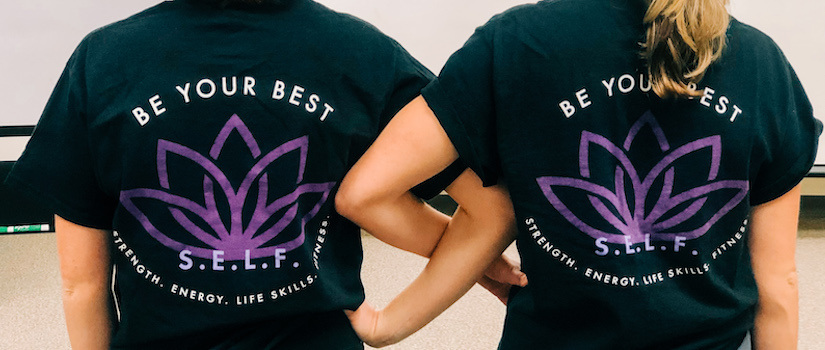For two Honors College seniors, a thesis project empowered an at-risk population
By Zoe Nicholson, Honors College journalism, Class of 2019
Friends since freshman year, recent graduates Casey Hasenbein and Rachel Wood grew
so close during their four years in the Honors College that they can finish each other’s
sentences. So it was only natural that the exercise science majors would want to work
on their senior thesis together.
“We asked ourselves, ‘What’s an at-risk, under-served population we can help?’” Hasenbein
says, explaining that she and Wood didn’t want to write a more conventional research
paper for their thesis. Their preference was to continue their passion for health
and fitness, and to share it with those who needed it.
Hence the creation of Be Your Best S.E.L.F. (Strength, Energy, Life Skills and Fitness),
their thesis project that ultimately bonded them to a group of girls at Epworth Children’s Home in Columbia. It didn’t come easy, and it didn’t come fast, but by the conclusion
of their seven-month program, Hasenbein and Wood had learned a big lesson too: Before
they could teach anybody about health and fitness, they had to gain their students’
trust.
Showing up Monday night after Monday night eventually drew the younger girls to the
older ones. “The first time we hosted they were standoffish and giggling at us,” Wood
says. “But later, they came and talked to us and were open. Having consistent people
in their lives started to change the girls’ attitudes towards us.”
In the beginning
When they began planning their program, Hasenbein, from New Jersey, and Wood, from
Illinois, didn’t know where to find the right group of students in Columbia. Angie
Sellers, Wood’s boss at FIT Columbia, suggested Epworth. With Epworth’s permission,
an SCHC thesis grant, and help from thesis advisor Barbara Cuevas, a clinical instructor
in the Arnold School of Public Health, Be Your Best S.E.L.F. launched. The duo began
teaching 10 to 20 high school girls in October.
“We wanted it to be fun,” Hasenbein says. “We didn’t want it to be so intense that
they come in and we say, ‘Do 50 burpees.’”
Wanting to also make it practical and empowering – they knew their students also would
be at risk for domestic violence – they solicited help from SASS (Surviving Assault
Standing Strong), a Columbia company that provides self-defense training. Wood had
taken CEO Shannon Henry’s self-defense course at the University of South Carolina
during the spring 2018 semester, and thought her teacher would be a good fit for the
Epworth students. Henry quickly agreed.
“We were super-excited,” Henry says. She had recently founded SASS Go, a non-profit
arm that provides free self-defense instruction to at-risk populations. Its goal is
to reach “every woman, every girl, everywhere,” says Lisa Ewart, the organization’s
executive director. By August 2018, Be Your Best S.E.L.F. had two partners—SASS Go
and Epworth.
The program alternated focuses from week to week. One week Henry or Ewart would teach
self-defense moves or bring in a guest speaker, including representatives from the
sex trafficking non-profit Lighthouse for Life. Other weeks, Wood and Hasenbein led
the girls in an exercise program, or invited a Zumba instructor to make the girls’
sweat equity a bit more enjoyable.
In their seven months managing their program, Hasenbein and Wood learned that even
the best-laid plans may require some change. “We realized we weren’t exactly keeping
their attention, especially with the exercise portion,” Wood says. “So, we just wanted
to know what would be best for them, and if that meant we needed to restructure a
bit, that was okay.”
Using feedback from the students, who come from all over South Carolina, Hasenbein
and Wood decided to expand Be Your Best S.E.L.F. to two nights a week, a sign their
hard work paid off.
“We’re offering them not only health and wellness and physical activity, but on top
of it safety, security, and emotional intelligence,” Henry says. “It’s a well the
girls can come back to and get what they need.”
The SASS professionals were invaluable, Hasenbein says. “They always reminded the
girls, ‘You’re important and you’re worthwhile.’”
‘More critical than cars’
By the time Hasenbein and Wood were wrapping up their program in April, they had come
to agree with Shannon Henry that “relationships are more critical than cars and wealth.”
Befriending and mentoring the students was more rewarding than promoting a healthier
lifestyle, their original intent.
While Hasenbein and Wood are going out of state to physical therapy school after graduation,
Henry and Ewart are confident the program will continue somewhere, in some format.
“The fact that we all come in and say, ‘We do care,’ is powerful,” Henry says. “It’s
something the girls need to keep hearing.”
Stronger Together
During the last Monday night of the fall semester, Wood arrived at Epworth with reindeer
antlers, homemade brownies and a box full of Be Your Best S.E.L.F. T-shirts.
After listening to a guest speaker and advising Hasenbein and Wood about how they
could improve the program for the next semester, Wood handed the shirts out to the
girls.
A purple lotus flower adorned the back of the shirt. Purple, the official color for
domestic violence awareness, represents S.E.L.F.’s mission of domestic violence awareness
and prevention.
“The Lotus flower grows out of the mud,” Wood says to the students. “It says that
no matter where you came from...
… You can be beautiful,” Hasenbein concludes. The friends were still finishing each
other’s sentences.
